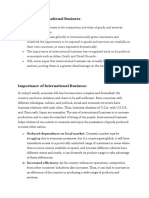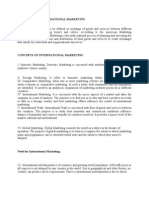Definition of International Trade
Definition of International Trade
Uploaded by
Sinta YuliawatiCopyright:
Available Formats
Definition of International Trade
Definition of International Trade
Uploaded by
Sinta YuliawatiCopyright
Available Formats
Share this document
Did you find this document useful?
Is this content inappropriate?
Copyright:
Available Formats
Definition of International Trade
Definition of International Trade
Uploaded by
Sinta YuliawatiCopyright:
Available Formats
Definition of International Trade
Quoting the explanation in Wahono Diphayana’s book Internasional Trade (2018),
international trade can also be defined as a business transaction between parties from more
than one country. Examples of business transactions are product export-import, purchase of
raw materials from abroad, to investment in other countries.
International trade activities can be carried out by residents of one country with
citizens of other countries, individuals from different countries, individuals with governments
of other countries, or governments of one country with other countries. Based on the
participating countries, International trade is divided into three types, namely bilateral,
regional and multilateral trade. Then, in terms of shape, as quoted from a review on the Bung
Hatta University website, the types of international trade transactions can be in the form of
export-import, consignment, package deals, border brossing, and so on.
Drivers of International Trade
International trade arises for various reasons. Some of these factors may vary from
country to country. International trade activities can be influenced by a number of factors,
which are as follows.
1. The needs of the state and society
A country is not able to provide all the needs of its population. International trade is
needed in the fulfillment of goods or services needed.
2. Differences in natural resources (SDA)
Each country has different natural resources because it has a different geographical
location. The existence of shortages and advantages of these natural resources makes
trade between countries.
3. The need for quality human resources (HR)
Not only goods traded in international economic activities. The services of qualified
human resources also compete in the international trade arena.
4. The need to increase state income
State income can be increased through international trade. For example, export-import
transactions have consequences for tax obligations that must be paid to the state.
5. The need for target market expansion
Some producers expand their sales to other countries. The accumulation of domestic
production of goods can be diverted to expanding overseas markets to increase
income.
6. Climatic differences
Different climates in different countries can affect the occurrence of international
trade. Different climates will have an impact on the type of natural resource wealth
and the needs of the community.
7. Differences in taste
The taste of citizens in different countries are always different. This opportunity is
captured by other countries with a production surplus to export to that country.
8. Ease of transportation between countries
the easier access to transportation, the greater the opportunity for export-import to
occur. Distribution travel time can also be cut faster to make trading easier.
9. The need for foreign support
The more trade partners you have, the greater the support from other countries to a
country. There are tradeoffs to be received.
1.1 Barriers to International Trade
Although international trade has existed for along time, international trade still faces
various obstacles. In general, there are many factors that cause international trade to
experience obstacles. The following are the inhibiting factors for international trade.
1. Different exchange rates
Each country has its own currency and each currency has the nature of fluctuations
based on market mechanisms. This, the currency owned by a country is only valid in
that country. Because of this, transactions and payments are difficults to carry put or
realized so that international trade is hampered.
2. International economic policy
Some countries have implemented free trade. However, if a country implements an
import restriction policy, international trade will be hampered. In other words, the
import restriction police can be an obstacle to the entry of imported products into the
country.
3. The occurrence of conflict in a country
In this case, the conflict in question, such as political chaos, riot war, and so on. If
there is a conflict in a country, the international trade process will be disrupted.
4. Export and import activities are too long
Export and import activities play an important role in the occurrence of international
trade. However, this activity must pass import duties and export duties in a country so
that export and import activities take a long time. Long time in export and import
activities is a barrier in international trade.
5. Low quality of humas resource
good quality human resource will result in a maximum production process. If a
country does not have a lot of natural resources then the country can maximize its
human resource. This, the lack or absence of good human resources is an obstacle in
international trade.
6. Regional economic organization in a country
At this time, regional economic organizations have developed a lot. However, this
development becomes an obstacle in the process of international trade because only
member countries of the organization are given access when conducting international
trade.
In other words, when conducting international trade transactions, it will be difficult
for countries outside the members.
Types of International Trades
There are several types of international trade which is conducted by an individual country or
a group of countries.
Referring to the notion of international trade, as for some of the types mentioned above are as
follows:
1. Export and Import
Most common forms of international trade. There are two ways to conduct a export,
that is common export (terms and conditions apply) and export without L/C (product
can be sent with trade department’s agreement).
2. Barter
Currently, barter or an act to buy a product with another is still widely used in
international trade. The kinds of which includes direct barter, switch barter, counter
purchase and buyback barter.
3. Consignment
Consignmentis is selling by sending a product out of a country to where a demand has
yet to be expected. Said sale can be done through the free market or trade exchange
by way of auction.
4. Package Deal
Trading that is done by trade agreement with another country.
5. Border Crossing
Act of trade that comes from two neighboring countries to ease transactions between
its citizens.
International Trade becomes an important agenda not just for commercial gain, but
also as a form of cooperation between nations.
Benefits of International Trade
International trade activity has actually been running for thousands of years before
Christ. As Progression of technology, transportations, and trade activity between countries
becoming much clearer.
Excerpt from the book of International Economy (2017) by Nazarudin Malik, here are the
benefits that can be gained by countries willing to cooperate in international trade.
1. The Establishment of friendly relations
Trading between countries is beneficial in forming a friendly relationship with other
countries. If said relations are improving, there is a big possibility that it can lead to
other sectors not just tied to trading.
2. Creating Efficiency and Specialization
Ongoing international trade will make a country to specialize in a certain economic
sector. Which means, the country and its residents will have special skills that are
different from other countries in producing goods and services.
3. Increases Prosperity
A Country’s prosperity indicator can be seen through its economic activities which
includes producer, consumer, and government. With the presence of international
trade, it will increase the prosperity of the country conducting the activity.
4. Decreases Unemployment
If the market of foreign trade is expanding, then the production of goods and services
in a country will also increases. This is because the demand of workforce will also
increase in other sector, and if that were to happen, it will automatically reduce the
number of unemployment.
5. Technology and Science Transfer
International trade also plays a large part in the mobilization of technology and
science, especially from developed country to developing country. International trade
will make it possible for the shipping of technology such as machinery and modern
equipment to those in need. Therefore, the progress of technology would increase
significantly on the imported country.
6. Stabilizing Prices
With international trade, goods shortages that can cause a rise in prices can be dealt
with imports to increase the stock in domestic markets. And vice versa, if a country
has a surplus of goods which can cause a decline in prices can be dealt with exports to
deliver the goods to other countries that are in need.
Negative Impacts of International Trade
Despite the numerous benefits that can be gained from international trade, this
economic act can also bring in some negative side effects. Here are the following.
1. Decline in Domestic Products
International trade will inevitably create a rivalry between country’s industry. If a
country’s industry has a lower quality and a relatively higher price of product
compared to others, then that country would experience a decline in demand. This is
due to consumers oftentimes looks for a good quality product with an affordable
price.
2. Dependency on Developed Countries
From the perspective of goods production, developing and third world countries will
have a significant dependency on developed countries when it comes to production,
especially those tied with technology. And from the perspective of consumer goods,
the development of electronics and automotives are controlled by developed
countries. As a result, developing and third world countries are only considered as
potential consumers.
3. Small industry have difficulty competing
Lack of funds is oftentimes an obstacle for small industry to improve itself.
International trade has the potential to restrict movements from small industries
because they would have to compete with national and multi-national industries with
larger funds.
4. Unhealthy Competition
A Country’s governmental act on win a competition in international trade, with the
passing of several policies such as dumping, and import tariffs is incorrect. Such
strategy damages the essence of international trade with the principle of a healthy
competition.
International Trade Policies
There are eight international trade policies, which are as follows.
1. Tariffs, taxes levied on imported goods.
2. Export Subsidies, payment that is paid to the company or individual willing to sell the
goods out of the country.
3. Import Restrictions, direct restrictions charged on the numbers of legal imported
goods.
4. Voluntary Export Restraint, is a voluntary control agreement.
5. Local content requirements, rules regarding certain parts of the physical unit.
6. Export credit subsidies, in the form of subsidized loans to buyers.
7. Governmental Control
8. Bureaucratic barriers are a form of restriction imposed by the government to limit
imports.
Sources:
https://ekonomi.bunghatta.ac.id/index.php/id/artikel/422-perdagangan-internasional-
pengertian-manfaat-jenis-dan-faktor-pendorongnya
https://www.gramedia.com/literasi/perdagangan-internasional/
#F_Kebijakan_Perdagangan_Internasional
https://tirto.id/pengertian-perdagangan-internasional-manfaat-dampak-dan-faktornya-f8ZK
You might also like
- Business Studies Grade 11 TERM 2 Notes 2023Document48 pagesBusiness Studies Grade 11 TERM 2 Notes 2023halegaye256No ratings yet
- Unit-1-Bba 3 Yr - International TradeDocument22 pagesUnit-1-Bba 3 Yr - International Tradeashish21bba043No ratings yet
- Economice SS3 Second Term NoteDocument42 pagesEconomice SS3 Second Term NotenwabuezecnwosuNo ratings yet
- BE 3 Unit Globlization StrategiesDocument15 pagesBE 3 Unit Globlization StrategiesHasrat AliNo ratings yet
- Int EconomicsDocument182 pagesInt EconomicsK ANo ratings yet
- Meaning and Reasons For International TradeDocument6 pagesMeaning and Reasons For International TradeMOHAMMED DEMMUNo ratings yet
- Itf A1Document7 pagesItf A1kr600143No ratings yet
- Advantages and Disadvantages of International TradeDocument8 pagesAdvantages and Disadvantages of International TradeNainesh Pandare100% (2)
- Term Foreign Trade Defination:: Goods and ServicesDocument77 pagesTerm Foreign Trade Defination:: Goods and ServicesIam Amy100% (1)
- International Trade: IntroductionDocument17 pagesInternational Trade: IntroductionDevyani RathoreNo ratings yet
- International Trade TopicDocument9 pagesInternational Trade TopicmaskiinNo ratings yet
- International BusinessDocument115 pagesInternational BusinessSakshi Relan100% (1)
- Module 8Document4 pagesModule 8Chin Keanna BuizonNo ratings yet
- The Structures of GlobalizationDocument4 pagesThe Structures of GlobalizationGerald Jaboyanon MondragonNo ratings yet
- Intro To Trade 8 Aug 2022Document31 pagesIntro To Trade 8 Aug 2022HarloiNo ratings yet
- An Overview of International TradeDocument4 pagesAn Overview of International TradeMark Russel Sean LealNo ratings yet
- 2 Why Do Nation TradeDocument4 pages2 Why Do Nation TradeAfrina JannatNo ratings yet
- International Economic NotesDocument57 pagesInternational Economic NotesAamale KhanNo ratings yet
- Final PRJCT EcoDocument42 pagesFinal PRJCT EcoHitesh MoreNo ratings yet
- NotesDocument21 pagesNotesAnitha NallasivamNo ratings yet
- Assignment 3Document11 pagesAssignment 3Vansh DuaNo ratings yet
- 02 - Dmba402 - International Business ManagementDocument7 pages02 - Dmba402 - International Business ManagementHari KNo ratings yet
- Import Chaptr 1Document10 pagesImport Chaptr 1Dawit MekonnenNo ratings yet
- Introduction To IBTDocument5 pagesIntroduction To IBTRica Hazel RoallosNo ratings yet
- EconomicsDocument15 pagesEconomicsemmanuelkakayayaNo ratings yet
- What Is Foreign TradeDocument2 pagesWhat Is Foreign Tradeviswaprakash_vNo ratings yet
- International Business - Meaning, Importance, Nature and ScopeDocument5 pagesInternational Business - Meaning, Importance, Nature and ScopeAdi ShahNo ratings yet
- Module 1 International Marketing Notes Amity UniversityDocument7 pagesModule 1 International Marketing Notes Amity Universityrohan_jangid8No ratings yet
- International Business I&iiDocument36 pagesInternational Business I&iilakshman rajNo ratings yet
- Tieng Anh Chuyen NganhDocument20 pagesTieng Anh Chuyen NganhTRAN THI BICH NGUYETNo ratings yet
- International TradeDocument28 pagesInternational TradeVaishnavi KrushakthiNo ratings yet
- Macro Economics: International TradeDocument28 pagesMacro Economics: International TradeAndaleeb AmeeriNo ratings yet
- Export and Import ManagementDocument29 pagesExport and Import Managementcatchrekhacool100% (6)
- Business in A Global EnvironmentDocument17 pagesBusiness in A Global Environmentria fajrianiNo ratings yet
- MGT107 IBT Midterm ReviewerDocument15 pagesMGT107 IBT Midterm ReviewerMary Grace AlzateNo ratings yet
- Chapter 6Document7 pagesChapter 6Abdul Aziz Khan AfridiNo ratings yet
- Handout 1 International TradeDocument3 pagesHandout 1 International TradeKatherine EspirituNo ratings yet
- International Business Trade Chapter 1Document8 pagesInternational Business Trade Chapter 1Danae CaballeroNo ratings yet
- Module 1 IfmDocument17 pagesModule 1 IfmAYISHA BEEVI UNo ratings yet
- International MarketingDocument40 pagesInternational MarketingThanga DuraiNo ratings yet
- Other IBMDocument282 pagesOther IBMNimmiroyNo ratings yet
- International TradeDocument43 pagesInternational TradeWASSWA ALEXNo ratings yet
- Chapter 1 SolutionDocument2 pagesChapter 1 SolutionRicha Joshi100% (1)
- Elec 4 Prelim ReviewerDocument5 pagesElec 4 Prelim Reviewerfujiko galboNo ratings yet
- Unit 1 Ibm Notes' PDFDocument12 pagesUnit 1 Ibm Notes' PDFChandrasekar IdumbanNo ratings yet
- Presentation 1Document24 pagesPresentation 1bansalsam546No ratings yet
- Chapter 1Document22 pagesChapter 1Amare SimachewNo ratings yet
- Block-3 Unit-1 Import ExportDocument18 pagesBlock-3 Unit-1 Import ExportYatharthAgrawalNo ratings yet
- LCDocument15 pagesLCsea waterNo ratings yet
- Introduction To International TradeDocument14 pagesIntroduction To International Tradel a t h i f a hNo ratings yet
- What Is International BusinessDocument10 pagesWhat Is International Businessহকের পথNo ratings yet
- Mayor, Courtney Denise S. (Online Exercise #1)Document3 pagesMayor, Courtney Denise S. (Online Exercise #1)Courtneydenise Semaña MayorNo ratings yet
- International Trade IR BS5Document5 pagesInternational Trade IR BS5Adnan KhanNo ratings yet
- Chapter 3 (LO 1-4) SummaryDocument2 pagesChapter 3 (LO 1-4) SummaryRaditya NugrohoNo ratings yet
- Export and Import Management 1Document32 pagesExport and Import Management 1Sri Ganesh ComputersNo ratings yet
- Chapter 7 International TradeDocument8 pagesChapter 7 International Tradegfyyyvbwz8No ratings yet
- Research Paper On International Trade in IndiaDocument8 pagesResearch Paper On International Trade in Indiapdtgpuplg100% (1)
- ECOMACDocument3 pagesECOMACquennieguanco22No ratings yet
- Sandeep Garg Solutions Class 11 PDFDocument22 pagesSandeep Garg Solutions Class 11 PDFSpecterNo ratings yet
- Introduction To Economics 1Document89 pagesIntroduction To Economics 1Jely Taburnal Bermundo100% (1)
- Generic Definition: ": Manufacturing Inventory: Besides Finished Goods, Also Includes Raw Materials Used inDocument12 pagesGeneric Definition: ": Manufacturing Inventory: Besides Finished Goods, Also Includes Raw Materials Used inRosita BarcaloungerNo ratings yet
- Lesson 10-Theory of Consumer's BehaviorDocument75 pagesLesson 10-Theory of Consumer's BehaviorGracielle Espiritu80% (5)
- Physical DistributionDocument61 pagesPhysical DistributionNawaz KhanNo ratings yet
- Understanding The Tourism Product: July 2015Document23 pagesUnderstanding The Tourism Product: July 2015Hiba BibaNo ratings yet
- Managerial EconomicsDocument14 pagesManagerial EconomicsKuldip PardeshiNo ratings yet
- Itc Summer Internship Report Mba2109057Document54 pagesItc Summer Internship Report Mba2109057Raja KumarNo ratings yet
- Market Demands For FruitsDocument15 pagesMarket Demands For FruitsShe Ki NahNo ratings yet
- The Concept of DemandDocument8 pagesThe Concept of DemandMark AggreyNo ratings yet
- Chapter 2 Inventory Management PoliciesDocument6 pagesChapter 2 Inventory Management PoliciesJojo ContiNo ratings yet
- Icse 2023 - 631 CSTDocument7 pagesIcse 2023 - 631 CSTarnav160608No ratings yet
- CaseHard 17CrNiMo6Document2 pagesCaseHard 17CrNiMo6Francisco Botelho Carlos100% (1)
- TG #01 - Abm 006Document9 pagesTG #01 - Abm 006Cyrill Paghangaan VitorNo ratings yet
- Cambridge O Level: Economics 2281/13Document12 pagesCambridge O Level: Economics 2281/13Zoya RashdiNo ratings yet
- Taiwan Kolin Corp. vs. Kolin ElectronicsDocument3 pagesTaiwan Kolin Corp. vs. Kolin ElectronicsMiles100% (2)
- Calculation Tensile and Hardness SteelDocument4 pagesCalculation Tensile and Hardness SteelJigar M. UpadhyayNo ratings yet
- Consumer Protection Act, 2019Document5 pagesConsumer Protection Act, 2019harshNo ratings yet
- 11 Business Studies - Business, Trade and Commerce - Notes and Video LinkDocument12 pages11 Business Studies - Business, Trade and Commerce - Notes and Video LinkOm ThakkarNo ratings yet
- Asim Sir Notes Unit 1&2Document44 pagesAsim Sir Notes Unit 1&2Vishal kumar singhNo ratings yet
- Project Proposal For Pharmaceutical Product LefetafoDocument32 pagesProject Proposal For Pharmaceutical Product LefetafoTesfaye Degefa100% (3)
- Unit 7 Index Numbers: StructureDocument27 pagesUnit 7 Index Numbers: Structurejazz440No ratings yet
- BRSbrsEng 20230915095948Document16 pagesBRSbrsEng 20230915095948Senda SurauNo ratings yet
- Modules For The Month of AugustDocument13 pagesModules For The Month of AugustLyn VallesNo ratings yet
- Teck 90 (Minus 40°C) HL Cable, 600 Volt, XLP (Rw90) : 90°C Conductor Temperature, Wet or DryDocument0 pagesTeck 90 (Minus 40°C) HL Cable, 600 Volt, XLP (Rw90) : 90°C Conductor Temperature, Wet or Dryvenky4025No ratings yet
- Business Activity 2Document46 pagesBusiness Activity 2Aghaanaa JaiganeshNo ratings yet
- Consumer Behaviour: Law of Diminishing Marginal UtilityDocument3 pagesConsumer Behaviour: Law of Diminishing Marginal UtilitymeenakshiNo ratings yet
- Topic 2 Types of Economics System ConventionalDocument56 pagesTopic 2 Types of Economics System ConventionalAlyaa HusnaNo ratings yet
- Utility and Demand: Key ConceptsDocument16 pagesUtility and Demand: Key ConceptsOng Wei LingNo ratings yet

























































































